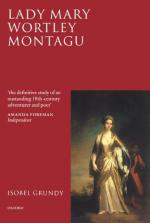|
This section contains 7,892 words (approx. 27 pages at 300 words per page) |

|
SOURCE: “Travel Narratives and Orientalism: Montagu and Montesquieu,” in Critical Terrains: French and British Orientalisms, Cornell University Press, 1991, pp. 30-74.
In the following excerpt, Lowe compares the Turkish Embassy Letters to the “tradition of letters about traveling in Turkey,” and asserts that “Montagu distinctly sets herself apart from that tradition by criticizing the representations of women, marriage, sexuality, and customs” in the travel accounts of her male predecessors.
Eighteenth-century portraits of the oriental world as an exotic, uncivilized counterpart of Europe were crucial enunciations of the discourses that produced representations of the European world as knowing, stable, and powerful. Travel literature performed these acts of symbolization for French and English culture; by figuring travelers in foreign lands encountering strange and disorienting customs and practices, the trope of travel allegorized the problems of maintaining cultural institutions amidst challenging othernesses, of establishing cultural standards and norms in the context of...
|
This section contains 7,892 words (approx. 27 pages at 300 words per page) |

|


